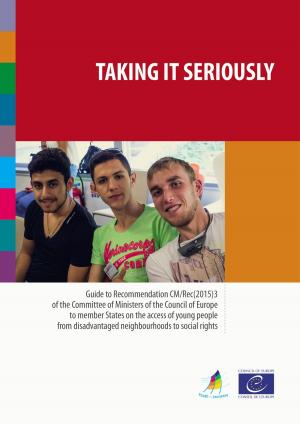Digital citizenship education
Volume 1: Overview and new perspectives
Nonfiction, Reference & Language, Education & Teaching, Educational Theory, Aims & Objectives, Social & Cultural Studies, Political Science, Government, Civics| Author: | Divina Frau-Meigs, Brian O’Neill, Alessandro Soriani, Vitor Tomé | ISBN: | 9789287185884 |
| Publisher: | Council of Europe | Publication: | October 17, 2017 |
| Imprint: | Council of Europe | Language: | English |
| Author: | Divina Frau-Meigs, Brian O’Neill, Alessandro Soriani, Vitor Tomé |
| ISBN: | 9789287185884 |
| Publisher: | Council of Europe |
| Publication: | October 17, 2017 |
| Imprint: | Council of Europe |
| Language: | English |
Supporting children and young people to participate safely, effectively, critically and responsibly in a world filled with social media and digital technologies is a priority for educators the world over. Most young people in Europe today were born and have grown up in the digital era. Education authorities have the duty to ensure that these digital citizens are fully aware of the norms of appropriate behaviour when using constantly evolving technology and participating in digital life. Despite worldwide efforts to address such issues, there is a clear need for education authorities to take the lead on digital citizenship education and integrate it into school curricula. In 2016, the Education Department of the Council of Europe began work to develop new policy orientations and strategies to help educators face these new challenges and to empower young people by helping them to acquire the competences they need to participate actively and responsibly in digital society. This volume, the first in a Digital Citizenship Education series, reviews the existing academic and policy literature on digital citizenship education, highlighting definitions, actors and stakeholders, competence frameworks, practices, emerging trends and challenges. The inclusion of a wide selection of sources is intended to ensure sufficient coverage of what is an emergent topic that has yet to gain a strong foothold in either education or academic literature, but has received wider policy attention.
Supporting children and young people to participate safely, effectively, critically and responsibly in a world filled with social media and digital technologies is a priority for educators the world over. Most young people in Europe today were born and have grown up in the digital era. Education authorities have the duty to ensure that these digital citizens are fully aware of the norms of appropriate behaviour when using constantly evolving technology and participating in digital life. Despite worldwide efforts to address such issues, there is a clear need for education authorities to take the lead on digital citizenship education and integrate it into school curricula. In 2016, the Education Department of the Council of Europe began work to develop new policy orientations and strategies to help educators face these new challenges and to empower young people by helping them to acquire the competences they need to participate actively and responsibly in digital society. This volume, the first in a Digital Citizenship Education series, reviews the existing academic and policy literature on digital citizenship education, highlighting definitions, actors and stakeholders, competence frameworks, practices, emerging trends and challenges. The inclusion of a wide selection of sources is intended to ensure sufficient coverage of what is an emergent topic that has yet to gain a strong foothold in either education or academic literature, but has received wider policy attention.















